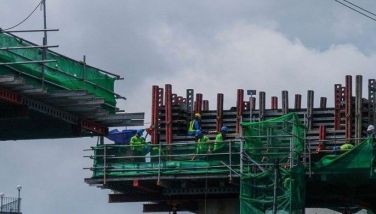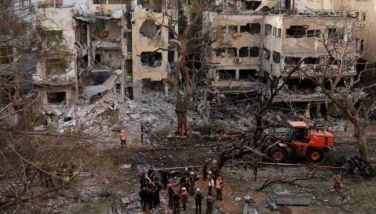Breaking the barriers to economic growth

The recent extremely positive Philippine economic news such as the 7.8% first quarter GDP growth, higher than China and highest in Asia-Pacific, and the improvement of global competitiveness ranking from 43rd to 38th , overtaking Indonesia and India, cannot be attributed to any single event like election spending as proposed by certain quarters.
These economic news must also include the recent upgrading of Philippine credit rating to investment grade, the increase in tourist arrivals and the year-on-year increase in the PSE index. As I said in a previous column, all these economic developments which have made the Philippines Asia’s rising economic star, are the result of presidential leadership and the political will resulting in the successful execution of the administration’s economic game plan during the first two years of this administration. The positive effects began to be felt during the second half of 2012.
The economic game plan began with the need to immediately address the four major bottlenecks that have been the obstacles to the Philippine economic for many decades.
The first major bottleneck was the systemic corruption in all branches of government — executive, legislative and judiciary. This is the reason the President has been so focused on his anti-corruption crusade and on good governance.
The second bottleneck was the lack of infrastructure to support major business and agricultural activities throughout the archipelago. After finally streamlining and improving the government programming and implementation process, the government has now begun to embark on ambitious infrastructure building programs and will also put to an end the existence of “ghost†roads and bridges.
The third bottleneck was in the area of development, which meant increasing investments in education, health and nutrition. This means implementation of the K-12 programs, access to classrooms for all, expanding the coverage of the PhilHealth program and reducing the incidence of hunger especially in Mindanao.
The fourth bottleneck was environmental degradation brought about by climate change, illegal logging and increased pollution. This means reviving and emphasizing sustainable development and environmental protection.
But the struggle to make these gains sustainable is a continuing journey. Take the recent case of the TRO issued by three Justices of the Court of Appeals – Romeo Barza, Francisco Acosta, Angelita Gacutan — on a 5 Billion peso smuggling case filed by the Department of Justice against Phoenix Petroleum CEO Dennis Ang Uy and his customs broker Jorian Capiin Cabanes. This case was expected to be a major step in the government’s effort to stop the smuggling of petroleum products.
The Finance Secretary immediately issued the following statement: “TROs like this one effectively prevent the government from prosecuting smuggling. Our courts and court processes should not be used by a few to block our progress in enforcing customs laws and creating a level playing field.â€
In the disastrous aftermath of this TRO, several business organizations issued statements condemning the TRO. Let me quote from the statement of the Makati Business Club.
“The anti-corruption agenda of the President has proven to be the key to unleashing the Philippines’ potential to attract the right kind of investors, hastening economic progress and restoring confidence and pride and pride amongst Filipinos.
Smuggling cannot be done without connivance with a government official or employee. The implication is clear – where there is smuggling, there is corruption. The Makati Business Club applauds the recent actions of the government to stop corruption ....â€
Unfortunately, these efforts to stop smuggling are being impeded by the Courts’ issuances of TROs and injunctions, motions for reconsideration, inhibitions, postponements, extensions of time without legal or factual basis. These subvert the Aquino government’s goal to create a globally competitive and business friendly climate in the Philippines.â€
The strongest part of the statement was the assertion of the Makati Business Club that efforts to stop smuggling are being impeded by the Courts’ issuances of TROs, injunctions, etc. “without legal or actual basis.â€
At the same time, Justice Secretary Leila de Lima publicly noted that two of the Justices, Francisco Acosta and Angelita Gacutan, were the same Justices who issued the decision ordering the Department of Justice to withdraw its syndicated estafa case against Global Asiatique head Cristina Sagun.
I am not a lawyer. That is the reason I will be asking more questions rather than giving answers.
What happens now? What happens to this case? Who or what body will determine whether there was really a failure of justice?
I asked some friends in the legal profession and members of the judiciary whose honesty and integrity I respect: Who is responsible for weeding out corruption in the judiciary? The common answer was the Supreme Court and the Court Administrator.
I found it very interesting to discover the pivotal role of the Court Administrator. One of his powers is the exercise of judicial discipline of the lower courts. Also, in the former Chief Justice Hilario G, Davide Jr.’s often quoted speech “The Davide Watch,†among the goals of judicial reform was the dynamic pursuit by the Office of Court Administrator of a continuing program “to strengthen ethical principles and moral values†as part of the supervision of the lower courts. Under the ABA-ROLI (American Bar Association — Rule of Law Initiative) project, one of the activities was the “strengthening of the capacity of the judiciary, particularly the Office of the Court Administrator, to investigate complaints against judges and court personnel.â€
Does this make the Court Administrator the implementer of the anti-corruption crusade in the judiciary?
A World Bank report on judicial reform said that fair and impartial judges protect the civil and political rights of citizens such as freedom of speech, association and religion. Judiciaries that are institutionally weak, subject to corruption and heavily politicized cannot fulfil these vital roles.
While an effective judicial system is important in the developed world, it is perhaps even more critical in countries where democracy is fresh and the need to institutionalize the rule of law is essential for development. Corruption along with a lack of transparency and predictability in court decisions undermines public trust.
Is it true that in our country it is easier to “fix†a case than to litigate one? I wonder how the many honest members of the judiciary and those who believe in the nobility of the legal profession feel when they hear statements like “In the Philippines, money buys justice?â€
But a lawyer friend told me it is hard for me to understand because I am not a lawyer. I reminded my friend that in a medical malpractice, it is the patient not the doctor who suffers the consequences. That is why I am asking these questions.
* * *
Email: elfrencruz@gmail.com
- Latest
- Trending



























